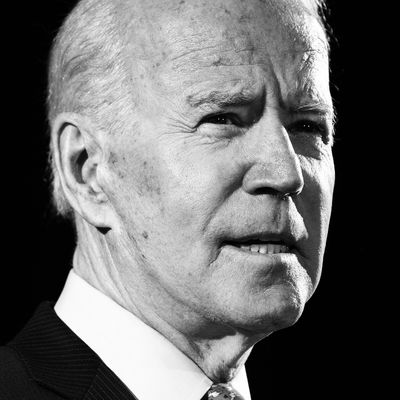
In an interview with Lawrence O’Donnell last night, Joe Biden played one of his signature rhetorical cards: When asked what he would say to women who were ready to support him over Donald Trump, but who found Tara Reade’s accusations of sexual assault against him credible, he told O’Donnell, “They probably shouldn’t vote for me.” The comments in full went like this: “They should vote with their hearts, and if they believe Tara Reade, they probably shouldn’t vote for me. I wouldn’t vote for me if I believed Tara Reade.”
Biden has used the “don’t vote for me” approach before: He’s said the same thing to rallygoers challenging his climate-change platform, for example, and to a man who publicly criticized the Obama administration’s deportation record. It’s certainly a tactic, and it must have worked for him or he wouldn’t keep using it. It’s possible that for many Democrats who would like to move on from Reade’s allegations, his statement will do the trick. Biden’s “Lookee here, Buster” sound bites come off like straight talk, with a side of no-nonsense rationality. “No malarkey,” or whatever. But in using it this time, he’s doing something more than just offering a reasonable-sounding response to appease critics. “Vote with your hearts” is a directive to move on now, stop agonizing.
Those of us who loathe Trump and understand that four more years of his administration would be untenable for the country have been left with no choice but to vote for Biden. Pretty much nothing he says is ever going to make me vote for him with my heart. Still, that comment is irksome and worth dissecting because it matters for the future.
Biden’s measured offer to take it or leave it conveys certitude without aggression, in contrast with Trump’s insults and castigation of the women who have accused him of assault and harassment, and instead of the braying defiance of, say, Brett Kavanaugh sniveling at his confirmation hearing. The plainspoken confidence, mixed with the right buzz phrases — “I see you and I hear you,” and “Women should be listened to” — strives to convey wiseness, calm over hysterics.
But this reasonableness, for those of us who have already resigned ourselves to voting for Biden, is a bluff. “If you believe Tara Reade, don’t vote for me” is a smoke screen. It belies the fact that there are many people who do believe Reade but intend to vote for him in spite of that, people who’ve already done the painful calculus and decided that the reasonable option is to vote against their hearts.
Instead of helping us become better at reckoning with allegations of sexual misconduct against powerful men, the past three years have somehow led us to this unsophisticated place. Biden felt free to put our choices in such simplified terms of “believing” Reade because the recourse for women making these kinds of accusations remains mired in he-said, she-said power struggles and self-interest. From the very beginning, those parties terrified of compromising Biden’s chances against Trump, no matter what, have done everything they can to avoid genuinely confronting Reade’s story. It took weeks for Reade to secure an on-camera news interview. Opinion writers have focused on calling for polygraph tests and collecting every detail of her personal life that may discredit her. All of the things we ostensibly learned from the Me Too movement, all of the lessons that were meant to help us better approach women like Reade — recognizing that someone you know very well could have harmed others in a way that to you seems unimaginable; understanding that allegations change over time as accusers reckon with them themselves; knowing that many situations will never elicit perfect evidence nor perfect accusers — have flown out the window.
Just like “believe women” reduces all of these nuances to an impossible binary, “Don’t vote for me” attempts to shut down real conversation that addresses Reade’s credibility. It also negates the reality of our political predicament, in which Biden is all but definitely the Democratic nominee, what AOC called a “messy moment” for the party. So we are left with Biden — but half-heartedly, at best.


